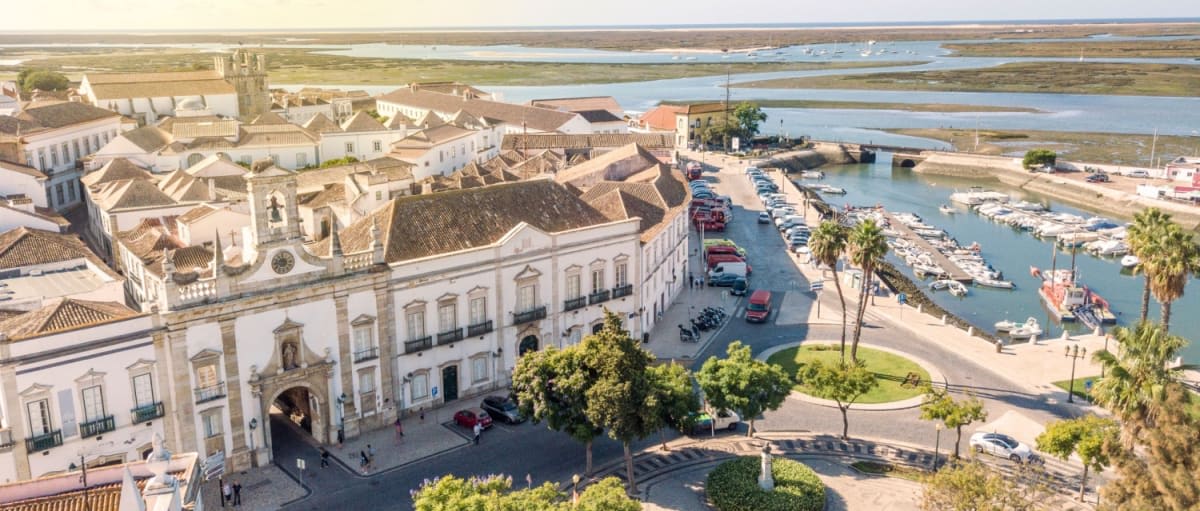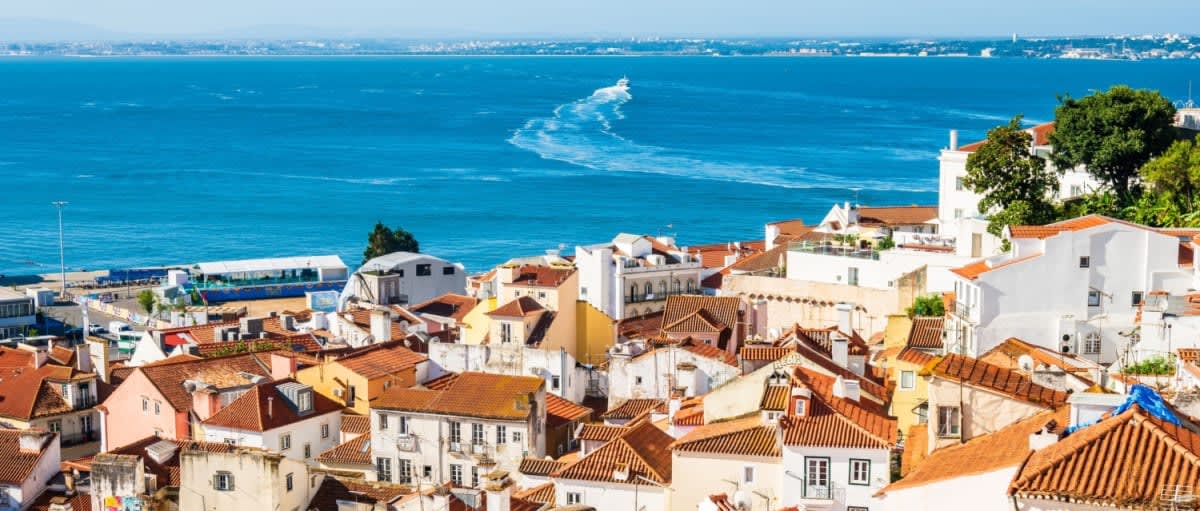Purchasing a home in Portugal as a foreign buyer can be a rewarding experience, but the legal process is not without its complexities. Navigating unknown regulations, language barriers and unfamiliar procedures can be daunting without professional guidance. Hiring a lawyer in Portugal is a vital part of buying a home because they’re the person in the room on your side. That’s why appointing a qualified property lawyer in Portugal is not just a smart move – it’s essential.
Whether you’re looking for a retirement home in the Algarve, an investment flat in Lisbon or a permanent residence in Porto, a specialist property lawyer works for you. Their role is to safeguard your interests, manage legal risks and ensure every step is compliant with local regulations.
Visas, tax, inheritance rules and property law all vary from what you may be used to. With a trusted lawyer by your side, you can purchase with confidence and clarity.
Download the Portugal Buying Guide
Contents

Why you need a property lawyer in Portugal
Hiring an independent lawyer is one of the most important decisions you’ll make when buying in Portugal. Unlike estate agents or notaries, your lawyer works solely for you and has no vested interest in the transaction going ahead quickly. Their responsibility is to ensure every detail is secure, legal and fully explained.
Portuguese property law can be different to that of your home country. There may be conditions tied to the land or building, unpaid taxes, inheritance claims or local planning changes that only a professional would uncover.
If you’re planning to relocate, your lawyer’s support often extends far beyond the property itself. They can help apply for your NIF (tax number), assist with residency visas, clarify inheritance rules and guide you through Portugal’s tax system. Comprehensive legal advice is especially useful for retirees, families and investors who want to avoid making costly mistakes.
Portugal also has specific restrictions around short-term rentals and protected zones. These can vary by region, and failing to understand them can cause legal issues later on – for instance, if you buy a holiday home only to find out that tourist rentals are banned in the area. An experienced lawyer will make sure your plans are both permitted and protected under Portuguese law.
For a detailed breakdown of the purchasing process, claim your free copy of our Portugal buying guide:
Download the Portugal Buying Guide
Legal checks and due diligence
Once your property offer has been accepted, the legal due diligence process begins – and this is where your lawyer really proves their worth. They will carry out a full investigation of the property to ensure it is legally safe to buy.
This includes checking title deeds, verifying ownership, confirming mortgage status, ensuring the correct planning permissions are in place, and that the seller has the legal right to sell. If any red flags appear – such as illegal extensions or unknown co-owners – these must be resolved before contracts are signed.
Your lawyer will also handle the preparation and review of the contrato de promessa de compra e venda (promissory contract). This binding agreement sets out all the terms of the sale and often requires a deposit of 10%. Your lawyer will explain the implications clearly and may also receive and transfer funds on your behalf, often via a regulated currency specialist.
In addition, lawyers can be granted power of attorney to act for you in Portugal – useful if you live abroad and cannot attend appointments in person. Read up on what overseas buyers need to know about power of attorney. This gives them legal authority to sign documents, liaise with authorities and finalise the purchase on your behalf, all within the framework of Portuguese law.
Lawyer vs notary: what’s the difference?
In Portugal, property transactions require both a notary and a lawyer – but it’s important to understand their different roles.
The notary’s job is to act as a neutral public official. They ensure all the legal documents are in order, verify identities, witness the signing of contracts and register the property with the local land registry. They cannot provide legal advice or act in your interests specifically. Their duty is to the state – not to the buyer nor the seller.
By contrast, your lawyer provides personalised legal support. They examine the contract before signing, raise concerns, confirm the legitimacy of the property, and explain each step in a language you understand. They can protect your interests even if that means advising you to walk away from a transaction.
Both roles are essential, but only your lawyer is on your side. Without professional legal support, you might agree to clauses that are unfair or overlook crucial legal flaws.
Notaries are involved from the promissory contract stage through to completion, when you sign the final deed (escritura de compra e venda). Your lawyer will liaise directly with the notary, estate agent and seller’s representative, ensuring the process is coordinated correctly.
How much do lawyers in Portugal cost?
Legal fees in Portugal can vary depending on the law firm, complexity of the transaction and property type. As a general guide, buyers can expect to pay between 1–3% of the property’s purchase price in legal fees.
Some lawyers may charge a flat fee, while others work on a percentage-based model. Always request a written quote before committing, and be clear on whether VAT (called IVA in Portugal) is included.
More established firms may charge more, but often deliver multi-lingual services, broader expertise and greater peace of mind. Fees also tend to be higher for purchases involving company structures, inheritance planning or visa applications – common requirements for international buyers.
Try not to choose a lawyer based solely on price. The right legal advice could save you thousands in the long run by identifying risks before they become costly problems. Make sure their quote clearly outlines what services are included and whether translations, power of attorney, liaising with authorities or after-sales support are billed separately.
How to find a good property lawyer in Portugal
The best time to appoint a lawyer is before you start viewing properties. This gives you time to confirm their credentials, understand what they offer and receive legal guidance early on.
Look for law firms or individuals registered with the Portuguese Bar Association (Ordem dos Advogados). Specialisation in property law is essential – as is experience with international clients and cross-border transactions. If you need help with residency, inheritance or tax, choose a lawyer who offers these services.
Personal recommendations go a long way. Speak to other expats or buyers who’ve worked with a lawyer in the area. Forums and property groups can also offer useful feedback.
At Your Overseas Home, we only recommend carefully vetted law firms with a strong track record supporting international buyers in Portugal. Have a look through our recommended experts. Each partner we work with is qualified, trusted and experienced in helping non-residents buy safely and successfully.
Be prepared for some firms to charge for consultations, especially when they provide detailed personal advice from the outset. However, others offer free no-obligation calls – an ideal way to understand your options and the service offered.
Language and communication support
Legal documents in Portugal – such as contracts and property deeds – are drawn up in Portuguese, even if the buyer is from abroad. This can lead to misunderstandings or oversights unless steps are taken to bridge the language gap.
Luckily, many Portuguese law firms who specialise in international buyers offer services in English. In areas popular with expats, you’ll often find fully bilingual professionals who can explain complex legal language in clear terms.
Even so, confirm early on whether your lawyer is fluent in your language and able to provide translated documentation either professionally or in-house. Do not rely on unofficial translations, as these hold no legal value and may introduce errors.
Some firms often assign English-speaking associates to international clients. Others may offer translated contracts and summary documents, ensuring you understand every obligation before signing.
If your local lawyer doesn’t speak your language confidently, consider working with a legal translator or interpreter. It’s vital you fully understand what you’re agreeing to – especially for contracts that can be legally binding and financially significant.
Want help finding a lawyer you trust? Contact Your Overseas Home today and speak with a recommended, experienced legal expert. We can help match you with a lawyer suited to your location, property goals and legal requirements. It’s your move – make sure it’s protected.
Hiring a lawyer is just one part of the buying journey. To understand every step from start to finish, read our comprehensive guide on how to buy property in Portugal. If you’re still exploring locations, our overview of where to buy property in Portugal can help you compare regions and make an informed decision.
Frequently asked questions
Yes, hiring an independent property lawyer is highly recommended. They protect your interests, carry out legal checks, draft and review contracts, and guide you through every step of the process – ensuring the transaction is safe and fully compliant with Portuguese law.
A property lawyer in Portugal conducts due diligence, ensures the seller has legal ownership, verifies planning permissions, manages contracts, and can act on your behalf with power of attorney. They also assist with tax numbers, visas and inheritance questions if needed.
Legal fees typically range from 1% to 3% of the purchase price, depending on the firm and transaction complexity. Some charge a flat fee. Always get a written quote upfront and check whether VAT and translation services are included.









